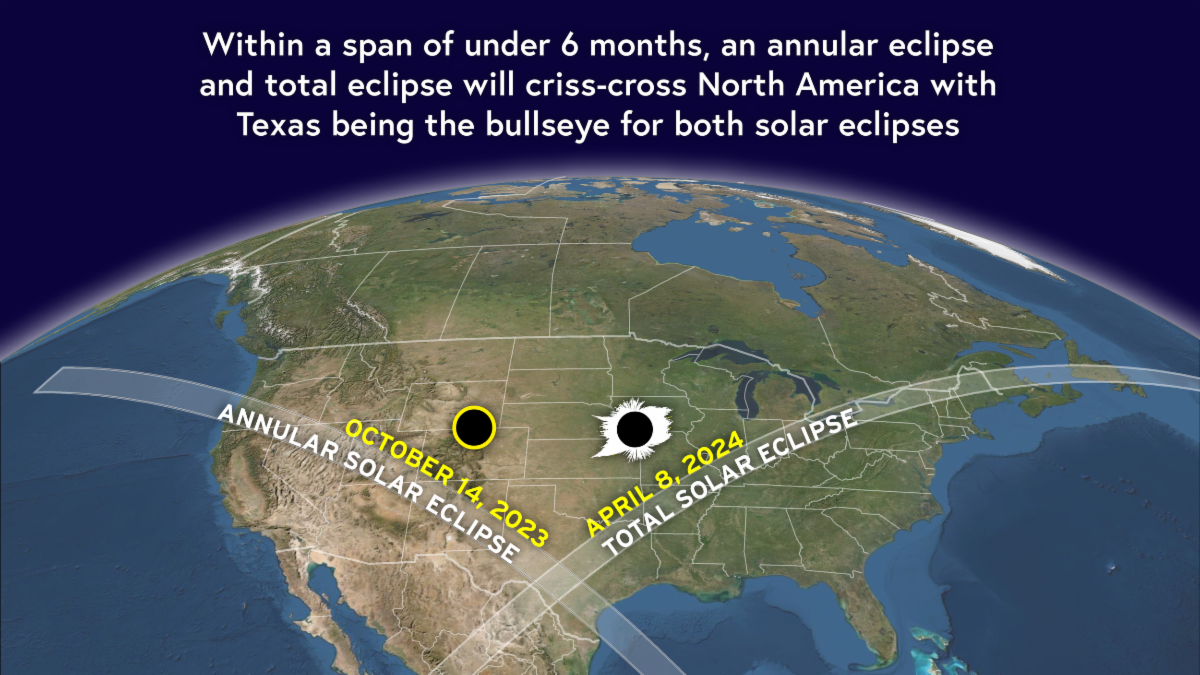
For scientists studying the Sun, solar eclipses offer rare opportunities to do important research, like studying how the Sun’s corona, or outermost atmosphere, behaves. If you’re planning on being in the viewing path (see map below!) for an upcoming eclipse, you can collect and share important eclipse data with these five citizen science projects!
And remember to join us virtually on Sept. 19th at 7pm ET for a special Do NASA Science LIVE! with special host Phil Plait, aka The Bad Astronomer. We’ll be discussing real NASA research projects that scientists are asking everyone everywhere (in the viewing path or not) to participate in. Learn more and register for the event here!
Cheers,
The SciStarter Team
Will you be in the path of the October 2023 or April 2024 eclipses?

During the 2017 total solar eclipse, over 1,300 citizen scientists spread out across the path of totality with their cameras created the first-ever Megamovie — watch it here!
You can participate during the 2024 eclipse to again help create an open-source video dataset that can be studied by scientists for years to come. All you have to do is take photos during and after the upcoming total solar eclipse.
Location: Apr 2024 eclipse viewing path
This NASA Science Activation project aims to find out how life on Earth, specifically wildlife, responds to eclipses. You do not need to be on the eclipse path to submit observations!
If you are in the path of totality, you can also sign up in advance to collect sound data during the week of the eclipse. Read more about how to become a data collector.
Location: Everywhere, during Oct 2023 and Apr 2024 eclipses
The Earth is a solar-powered planet. So what happens to clouds when the Sun’s light is blocked, even temporarily?
Help answer this question by collecting data about air temperature and clouds during both upcoming eclipses with NASA’s GLOBE Observer app and a thermometer.
Location: Oct 2023 and Apr 2024 eclipse viewing paths
Become a an eclipse broadcaster! Join an online network that will conduct coordinated solar observations leading up to and during the both upcoming eclipses, and broadcast them to the world.
Volunteers do not need observational astronomy experience and will receive training and participate in practices leading up to eclipse observations.
Attention educators! This is an excellent STEM project for middle school to college-level students.
Location: Oct 2023 and Apr 2024 eclipse viewing paths
Photograph the April 2024 Eclipse across its path of totality with the SunSketcher mobile app. This database of images can help scientists by mapping the sun’s shape with unprecedented precision.
It may even help reveal the Sun’s gravitational waves, allowing for testing of Einstein’s General Relativity theory of gravity!
Location: Apr 2024 eclipse viewing path
SciStarter LIVE!
Join the SciStarter team Tuesdays from 2-3PM ET to hear from project leaders, get tips on participating and learn about the impact of contributing to volunteer powered science. Join in from anywhere via Zoom or watch the live stream on SciStarter’s Facebook page.
September 12: Gaming To Make Discoveries and Solve Problems. Join us on National Video Games Day and hear from the creators of two citizen science mini-games. Learn how they did it and what impact game players have had on research. Register here!
In case you missed it: Arizona Special: Monitoring Indoor Air Quality for Your Health and for Science Watch the recording.

Five NASA Projects. Two Eclipses. One Bad Astronomer (feat. special guest Phil Plait)
Join us for a special Do NASA Science LIVE! Tuesday September 19, 7-8:30pm ET.
Get ready for the North American eclipses happening October 2023 and April 2024. NASA scientists want your help sharing observations before, during and after the eclipses, from wherever you are. There’s information they can learn about the Sun only during these rare events!
Join our special host, “Bad Astronomer” Phil Plait to learn more during the interactive “Do NASA Science LIVE!” online, September 19th, 7-8:30 pm ET. Your next chance to see a solar eclipse in the U.S. won’t be until 2044, so don’t miss out!

Citizen Science Podcast
ICYMI: Give your dog (or cat) a personality quiz for science!
Are you curious about how your dog or cat compares to others? Would you like to contribute to science research that could benefit pets and people? Learn more about C-BARQ (for dogs) and Fe-BARQ (for cats) from the scientist who created them.

For Organizations: NASA seeks proposals for NASA GLOBE.
The Earth Science Division of NASA’s Science Mission Directorate is soliciting proposals for an organization or a team of multiple organizations to host the GLOBE Implementation Office (GIO) and collaborate with NASA in the implementation of GLOBE. Proposals are due October 6, 2023. For more information, check out their informational webinar.

What’s happening near you today? With Science Near Me, find a broad range of local science-related discussions, festivals, policy forums and events. Discover activities to do at home, star parties with local astronomy clubs, science nights at nearby bars and much more!
The Latest Blogs:
With One Citizen Science Survey, C-BARQ is Fueling Years of Research Into Dogs
SciStarter Brings Citizen Science to the MO Solar Eclipse Expo
5 Ways to Help Combat Pollutants to Protect Earth
Help NASA With Space- and Earth-Based Research!
Discover more citizen science on the SciStarter calendar. Did you know your SciStarter dashboard helps you track your contributions to projects? Complete your profile to access free tools. Want even more citizen science? Check out SciStarter’s Project Finder! With citizen science projects spanning every field of research, task and age group, there’s something for everyone!






